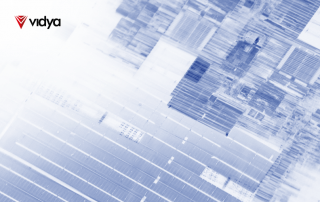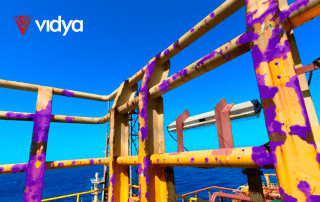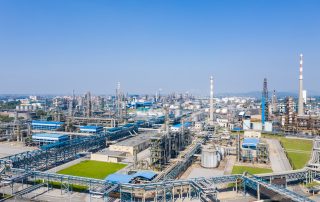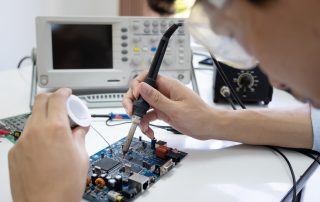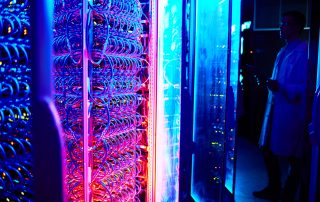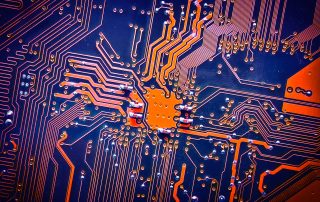Computer Vision 101: How can AI see things?
A world where computers can understand the environment around them simply by looking. This isn't science fiction anymore. It’s the new frontier of artificial intelligence called Computer Vision. It can perceive its surroundings and interpret visual information to identify objects, colors, shapes, and areas. This technology consists of a model that learns information from multidimensional data, such as images or videos, enabling machines to develop a visual perception like humans. Today, Computer Vision systems can analyze vast amounts of visual data with incredible accuracy. But how exactly was Computer Vision developed? How does it work? And what are the [...]
How to leverage the full potential of AI Predictive Maintenance
Industrial maintenance is a crucial but challenging aspect of large-scale process industries. Traditional maintenance methods result in expensive, risky, time-consuming, and often inefficient activities. This has led to a growing implementation of digital technologies to optimize maintenance, which made clear the opportunities that these optimized processes offered, like foreseeing anomalies with predictive maintenance for example. However, successfully implementing this maintenance approach requires the integration of different cutting-edge technologies. Despite the complexity surrounding the adoption of predictive maintenance, we need to understand its leveraged opportunities in industrial environments. Why industrial maintenance requires predictive care Industrial maintenance can be a [...]
The 4 levels of Spatial Computing
Spatial Computing might be the next frontier of technological evolution. This technology blends virtual and physical environments for seamless interaction. Certainly, Apple's Vision Pro had a significant impact on the popularity of the concept among tech enthusiasts. Yet, it still represents a slightly abstract idea for most people, as it consists of a brand-new technology that presents different levels of immersion and integration within its scope. In this regard, it’s important to analyze the concept behind the different Spatial Computing levels. Virtual Continuum The concept surrounding Spatial Computing is defined as the Virtual Continuum. It represents [...]
Why traditional Corrosion Management methods are becoming obsolete
Offshore Oil operations are constantly threatened by an inevitable factor: Corrosion. Heavy corrosion damage can lead to extended unplanned shutdown times, decreased safety, and increased environmental exposure. This is why Oil and Gas companies struggle with traditional Corrosion Management methods becoming obsolete. However, corrosion management isn’t an easy task, involving locating, prioritizing, and treating corrosion signs along +300,000m² areas. Besides that, while operations need to execute interventions, they need to deal with limited maintenance time, budget constraints, and costly downtime. For this reason, the sector’s complexity requires an alternative method of addressing corrosion. The Importance of Corrosion Management [...]
What is a Data Lake?
Since the digital transformation, many data have begun to be gathered in the midst of industrial processes and operations. Technologies such as machine learning, big data, and cloud computing are some of the tools developed in this period in order to handle this data so that it can become useful. Within this scenario, a new concept of storage starts to be discussed. In this text we will address what are the main characteristics, definitions, and benefits of a Data Lake, and what opportunities this concept creates for data scientists who want to extract maximum value from data. What [...]
How smart industries will be
Can you imagine what the industries will be like 10 years from now? The concept of industry of the future or smart industries describes the application of different combinations of modern technologies to create a hyperflexible and self-adaptive operating and manufacturing capability. Smart factories are an opportunity to create new forms of efficiency and flexibility by connecting different processes and information flows. Some technologies are essential to this concept. Let's address the top 3 below. IoT - (Internet of Things) The Internet of Things is the ability of devices to communicate with each other without human [...]
A Guide to Better Leveraging IoT Data (Internet of Things)
IoT (Internet of Things) has been widely used by the oil and gas industry, forming a large communication network between physical objects, which have any possibility of communication with each other. The use of this technology in industrial plants has allowed the extraction of gigantic amounts of data, bringing up the question: How to use IoT data efficiently? The path found by the oil and gas industries so that data can be used in order to generate valuable insights and turn them into actions that result in performance optimization, control, safety and greater fluidity of the process as [...]
IoT Solutions for More Control and Security in Industrial Operations
Technologies driven by Industry 4.0 and Digital Transformation have been helping many industries to adapt to a new model of operation based on digitization, which is establishing itself in the market. Among these new technologies, IoT (Internet of Things) is one that has been attracting attention due to its various applications. The importance of this technology for the industry and its functionalities applied to operations and processes are already well known by a large part of the sector. Many companies tend to adapt to this new scenario so that they can better enjoy the benefits generated by the application of [...]
The ultimate IoT (Internet of Things) fundamentals
In recent years, new technologies have driven what we now call Digital Transformation. From these new discoveries, many changes started to be part of the industries operation, and consequently, of people's daily life. Among the several new technologies, one of them stands out and draws the attention of many people and companies due to its fundamental role and its many functionalities: IoT (Internet of Things). Next, we will talk a little about the many factors that have made this one of the main technologies in digital transformation, generating new ways of operation and optimization for industries. The beginning of [...]
The 2 IoT (Internet of Things) trends for industries in 2021
The technologies driven by industry 4.0 and the digital transformation have been helping many industries to adapt to a new model of operation guided by digitalization, which is establishing itself in the market. Among these new technologies, IoT (Internet of Things) is one that has been attracting attention due to its various applications. The importance of this technology for the industry and its functionalities applied to operations and processes are already well known by a large part of the sector. Many companies tend to adapt to this new scenario so that they can make the best use of the [...]
